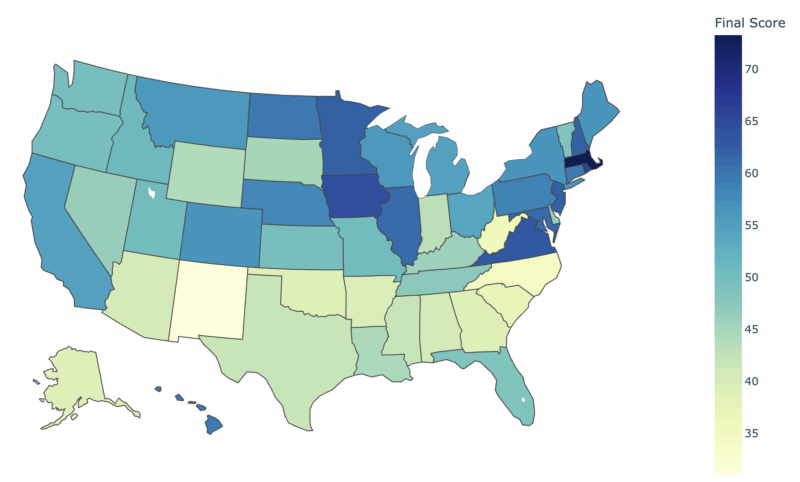
Written by Tamara Holmes
HealthCare Writer
We want to help you make educated healthcare decisions. While this post may have links to lead generation forms, this won’t influence our writing. We adhere to strict editorial standards to provide the most accurate and unbiased information.
Key Highlights
-
Top carriers include Pivot Health, Everest, Independence American, National General, and UnitedHealthcare, all offering flexible short-term coverage options.
-
Plans vary in cost and duration, ranging from about $70 to $165 per month and lasting 30 days up to three years.
-
Coverage typically includes doctor visits, emergency care, and telehealth, but excludes pre-existing conditions and most preventive services.
-
Short-term health plans are ideal for healthy individuals between jobs or outside open enrollment, offering temporary protection at lower monthly costs.
Finding the best short-term health insurance company to meet your needs can be challenging. When it comes to your health, you want a policy you can depend on and one that is worth the money. By checking out short-term health insurance companies, you can determine which ones have a solid reputation, and you have a better chance of ending up with a product that will meet your needs.
Who Are the Established Top Short-Term Health Insurance Carriers?
If you’re looking for a short-term health insurance policy, these carriers should be on your list to consider.
| Insurance Company | Typical Premium (35-year-old woman, no children) | Coverage Highlights | Additional Offerings |
|---|---|---|---|
| Companion Life Insurance Company (Pivot Health) | $72/month | Visit any doctor (no network); includes telehealth/video consults | Dental and vision plans |
| Everest Reinsurance Company | $164.58/month | Co-pays: $30–$50; deductibles: $1,000–$10,000; no prescription coverage unless hospitalized | Accident coverage; disability income protection for sports teams |
| Independence American Insurance Company | $138.27/month | Covers lab tests, ER visits, hospital stays; excludes pre-existing conditions and sports injuries | Hospital & Surgical Indemnity; Dental & Vision plans |
| National Health Insurance Company (National General) | $122.84/month | Uses Aetna or Cigna PPO networks; doctor visit $50; generic Rx $10 copay; coverage up to 3 years | Supplemental Coverage plans |
| UnitedHealthcare (Golden Rule Insurance Company) | $155/month | Offers TriTerm medical (up to 3 years); wide range of short-term options | Accident & Dental Insurance Bundles; preventive dental coverage |
Find Plans that meet your health needs and budget.
What You Need to Know
Once you understand the background of short-term health insurance companies, compare their policy options to find the best fit. Check the monthly premium to ensure the plan is affordable for your budget. Review the benefits to see how the short-term coverage measures up against other companies’ offerings. Consider total out-of-pocket costs, including deductibles and copayments, to confirm the plan is financially manageable. Keep in mind that short-term health insurance isn’t required to meet Affordable Care Act standards and may exclude coverage for pre-existing conditions.
A team of licensed insurance agents are here to help you compare plans
Who Offers Short-Term Health Insurance
- Companion Life Insurance Company (Pivot Health): A+ rating with telehealth options and access to any doctor
- Everest Reinsurance Company: In business for more than 40 years, with an A+ rating
- Independence American Insurance Company (The IHC Group): A-rated, plans offer coverage for lab tests, ER visits, and hospital stays
- National Health Insurance Company (National General): A-rated, policies are through Aetna’s or Cigna’s network
- UnitedHealthcare (Golden Rule Insurance Company): A rating with a collective 75 years of experience selling insurance.
Companion Life Insurance Company (Pivot Health)
Founded in 1971, Companion Life Insurance Company underwrites short-term policies for Pivot Health and enjoys an A+ rating from A.M. Best. Pivot Health is a division of HealthCare, Inc.
- With Pivot Health short-term health insurance plans, you can see any doctor without being confined to a network, as well as enjoy benefits such as telehealth or video consultations with doctors.
- The most basic plan for a 33-year-old woman with no children who lives in Austin, TX, costs $72 a month as of July 2025.
- In addition to short-term health insurance policies, Pivot Health offers solutions to other healthcare needs, such as dental and vision plans.
Everest Reinsurance Company
Everest prides itself on having been in business for more than 40 years, and has an A+ rating from A.M. Best to show for it. Their short-term health insurance plans can tide you over if you’re in a pinch with co-pay options of $30, $40 or $50 and deductible options that range from $1,000 to $10,000.
- For a 35-year-old woman living in Dallas who has no children and does not smoke, the most basic plan comes with a $164.58 premium per month.
- However, prescriptions aren’t covered unless they are prescribed during a covered hospitalization, and you’ll need to get dental and eye care taken care of elsewhere.
- In addition to short-term policies, Everest offers accident coverage, as well as disability income protection for professional sports teams.
Independence American Insurance Company
The Independence American Insurance Company has been in the insurance business for more than 30 years, and holds an A- rating by A.M. Best. Their short-term medical plans cover such health needs as laboratory tests, emergency room visits and hospital room and board, though they do not cover sport-related injuries or pre-existing conditions.
When it comes to cost, the Independence American Insurance Company points to the Centers for Medicare & Medicaid Services’ estimate that short-term plans will save you 31.5%, on average, of what you would pay for a traditional policy.
- For a 35-year-old childless woman in Dallas who does not use tobacco, plans start at $138.27 per month.
- In addition to short-term plans, the Independence American Insurance Company offers Hospital and Surgical Indemnity plans, and Dental and Vision plans.
National Health Insurance Company (National General)
National Health Insurance Company was incorporated in 1965 and is one of four companies that underwrite health insurance products for National General Accident & Health. The other companies are Integon National Insurance Company, Integon Indemnity Corporation, and Time Insurance Company, and all four of them have scored an A- (Excellent) rating from A.M. Best.
National General’s short-term health insurance policies are either through the Aetna network or Cigna’s PPO network, depending upon which state you live in.
- With monthly premiums starting at $122.84 for a 35-year-old woman living in Dallas with no children and no smoking history, you can choose coverage terms as short as 30 days or as long as three years.
- While you can expect out-of-pocket costs such as $50 per doctor visit and a $10 copay for generic prescription drugs, National General also offers Supplemental Coverage plans that would limit the amount you would have to pay if those costs started to add up.
UnitedHealthcare (Golden Rule Insurance Company)
In 2003, UnitedHealthcare acquired Golden Rule Insurance Company, and thanks to that acquisition, the joint company has 75 years of experience selling insurance. In 2019, UnitedHealthcare added HealthMarkets Insurance Agency and Chesapeake Life Insurance Company to its portfolio.
- With an A, or “Excellent” rating from A.M. Best, UnitedHealthcare offers a range of short-term plans, as well as TriTerm medical insurance for those who want short-term coverage for up to three years.
- UnitedHealthcare also bundles certain insurance offerings together, such as their Accident and Dental Insurance Bundle for unexpected medical expenses and preventive dental work.
- For a 35-year-old woman living in Dallas who has no children and does not smoke, the most basic plan comes with a $155 premium per month.
Who Are Additional Carriers Who Offer Short-Term Health Insurance Plans?
If you can’t find what you are looking for, these carriers also provide short-term offerings:
The North River Insurance Company
Like Companion Life Insurance Company, the North River Insurance Company underwrites policies for Pivot Health, a division of HealthCare Inc. North River Insurance Company is a subsidiary of Crum & Forster, an insurance provider that has been around since 1822.
LifeShield National Insurance Company
Since 1982, LifeShield has offered specialized healthcare solutions such as short-term medical plans, critical illness plans and accident coverage.
United States Fire Insurance Company
Like the North River Insurance Company, the United States Fire Insurance Company is a subsidiary of Crum & Forster.
What is Short-Term Health Insurance
Sometimes a traditional health insurance policy isn’t readily available. Maybe you’re temporarily between jobs and don’t want to pay a lot of money for COBRA. Perhaps you missed the open enrollment period and you have to wait until the next one. A short-term health insurance policy can tide you over so you have a limited amount of medical coverage if you need it.
How Does Short-Term Health Insurance Work?
You determine how long you want the coverage for, such as if you want the policy for 30 days or as long as 364 days. While a single plan can not top 364 days, it can be renewed up to three times, giving you approximately three years of coverage.
Short-term health insurance policies typically cover doctor visits and emergency care. However, it’s just as important to know what they don’t cover. Short-term health insurance policies do not meet the requirements of the Affordable Care Act, so you won’t have coverage for preexisting conditions. You also might not have prescription drug coverage unless you’re prescribed medication for a condition diagnosed under the plan. Also, preventive care may or may not be covered.
Who Should Consider Short-Term Health Insurance?
A person between jobs, a college student who’s about to graduate and get health insurance through his or her first job, or a person who missed their company’s open enrollment season might want to consider short-term health insurance. Anyone who’s relatively healthy and needs a policy to tide them over until they can get a more full-featured plan might find a short-term plan to be helpful.
Who Should Not Consider Short-Term Health Insurance?
If you have preexisting conditions or you need a long-term option for health care, you should skip the short-term health insurance options and look for a plan that can give you more protection, whether it is through your employer or through the Health Insurance Exchange.
When assessing health insurance companies, there are several factors you want to consider.
What Should You Consider When Comparing Short-Term Health Insurance?
An insurance policy is only good if the insurance company has the money to pay out on a policy if needed. To gauge the financial strength of an insurance company, you don’t want to take their word for it. Instead, check the financial rating of the insurance company by an independent agency that rates them, such as the A.M. Best Company or Fitch Ratings. A.M. Best rates insurance companies on a scale from A+ to D, with A+ indicating the company has a “superior ability” to meet ongoing insurance obligations.
Another factor to consider is the age of the company. If an insurance company has been in business for a relatively long period of time, they have a history behind them that a newer insurance company simply does not have. While it’s true that a company can fail at any time, an older company likely has a stronger foundation.
When assessing short-term health insurance companies, you may also want to look at whether they sell other types of policies, such as individual health insurance policies and limited benefit plans. The more full-featured their policy offerings, the more robust the short-term health insurance company is likely to be.
Next Steps
Choosing the right health insurance plan is always a serious matter. If you’re biding time and need limited coverage temporarily, look for a short-term health insurance plan that gives you the most coverage for your money. However, have a strategy in mind to find a more full-featured plan to cover your health insurance needs for the long term.
The views and opinions expressed are those of the authors and do not necessarily reflect the official policy or position of HealthCareInsider.com or HealthCare, Inc.
Find Plans that meet your health needs and budget.
Thank you for your feedback!
Insurance Information Institute. “How to Assess the Financial Strength of an Insurance Company,” iii.org, (accessed September 15, 2020).
A.M. Best. “Understanding Best’s Credit Ratings,” Ambest.com, January 2, 2019. (accessed September 15, 2020), 22.
U.S. Government Website for the Federal Health Insurance Marketplace. “Out of Pocket Costs.” healthcare.gov (accessed September 15, 2020).
Companion Life. “About Companion Life” companionlife.com (accessed September 17, 2020).
Pivot Health. “Pivot Health FAQ” pivothealth.com (accessed September 17, 2020).
Companion Life. “Companion Life Continues Excellent Rating Streak With 18th Consecutive A+ Rating” companionlife.com (accessed September 17, 2020).
Pivot Health. “Explore Short-Term Health Insurance Plans” pivothealth.com (accessed September 17, 2020).
Pivot Health Editors. Pivot Health. “Short-Term Health Insurance is a Great Solution During These Uncertain Times” pivothealth.com (accessed September 17, 2020).
Pivot Health. “Personalized Quotes” pivothealth.com (accessed September 29, 2020).
Pivot Health. “Quick and Friendly Coverage at Your Fingertips.” pivothealth.com (accessed September 17, 2020).
Everest Reinsurance Company. “About Everest” everestre.com (accessed September 17, 2020).
AM Best. “AM Best Affirms Credit Ratings of Everest Re Group, Ltd and its Subsidiaries” ambest.com, May 29, 2020, (accessed September 17, 2020).
Everest Reinsurance Company. “Short-Term Medical U.S.” everestre.com (accessed September 17, 2020).
Smart Insurance Marketplace Broker. “Compare Rates and Plans.” quote.sasid.com (accessed September 29, 2020).
Everest Reinsurance Company. “Short-Term Medical U.S.” everestre.com (accessed September 17, 2020).
Everest Reinsurance Company. “Accident & Health U.S.” everestre.com (accessed September 17, 2020.
The IHC Group. “About The IHC Group” ihcgroup.com (accessed September 17, 2020).
IHC Marketplace. “About the IHC Group” ihcmarketplace.com (accessed September 17, 2020).
“Connect, Short-Term Medical.” Independent American Insurance Company, 2020. (accessed October 8, 2020).
The IHC Group. “Short-Term Health Insurance” healthedeals.com (accessed September 17, 2020).
The IHC Group. “Quote Results” ihcmarketplace.com (accessed October 8, 2020).
The IHC Group. “Our Solutions” ihcgroup.com (accessed September 17, 2020).
National General. “Who is National General?” natgenhealth.com (accessed September 17, 2020).
National General. “Short-Term Medical” natgenhealth.com (accessed September 17, 2020).
National General. “Health Insurance Plans Available.” natgenhealth.com (accessed September 29, 2020).
National General. “Short-Term Medical: National General Accident & Health” natgenhealth.com (accessed September 17, 2020), 3.
“Short-Term Medical: National General Accident & Health,” 3.
“Short-Term Medical: National General Accident & Health.” 7.
UnitedHealthcare. “Our Company.” Uhone.com (accessed September 17, 2020).
“Our Company.”
“Our Company.”
United Healthcare. “TriTerm Medical Insurance Plans.” Uhone.com (accessed September 17, 2020).
UnitedHealthcare. “Bundle Insurance Plans to Meet Your Needs.” Uhone.com (accessed September 17, 2020).
UnitedHealthcare. “Short-Term Medical Insurance.” Uhone.com (accessed September 29, 2020).
Pivot Health. “Pivot Health Announces Partnership with Crum & Forster’s A&H Division to Design and Market High-Level Short-Term Medical Insurance Plans.” News release, July 9, 2020 (accessed September 17, 2020).
Crum & Forster. “About Crum & Forster.” cfins.com (accessed September 17, 2020).
LifeShield National Insurance Company. “About LifeShield.” lifeshieldnational.com (accessed September 17, 2020).
Crum & Forster. “Insurance Companies.” cfins.com (accessed September 17, 2020).
Colleen McGuire, Pivot Health “Short Term Health Insurance Coverage Duration Rules in Every State.” pivothealth.com. June 19, 2019 (accessed September 17, 2020).
United HealthCare. “Short-Term Health Insurance Frequently Asked Questions.” Uhone.com (accessed September 17, 2020).







